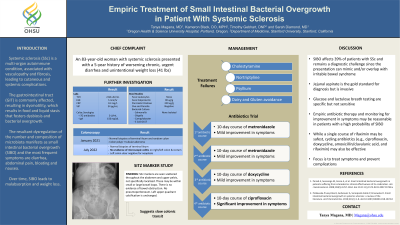Sunday Poster Session
Category: Small Intestine
P1556 - Empiric Treatment of Small Intestinal Bacterial Overgrowth in Patient With Systemic Sclerosis
Sunday, October 27, 2024
3:30 PM - 7:00 PM ET
Location: Exhibit Hall E

Has Audio

Tanya Magana, MD
Oregon Health & Science University
Portland, OR
Presenting Author(s)
Tanya Magana, MD, Kameron Black, DO, Timothy Gebhart, NP, Sarah Diamond, MD
Oregon Health & Science University, Portland, OR
Introduction: Systemic sclerosis (SSc) is a multi-organ autoimmune condition, associated with vasculopathy and fibrosis, leading to cutaneous and systemic complications. The gastrointestinal tract (GIT) is commonly affected, resulting in dysmotility, which results in food and liquid stasis that fosters dysbiosis and bacterial overgrowth. The resultant dysregulation of the number and composition of microbiota manifests as small intestinal bacterial overgrowth (SIBO) and the most frequent symptoms are diarrhea, abdominal pain, bloating and nausea. Over time, SIBO leads to malabsorption and weight loss.
Case Description/Methods: An 83-year-old woman with systemic sclerosis presented with a 5-year history of worsening chronic, urgent diarrhea and unintentional weight loss (41 lbs). Studies revealed normal thyroid stimulating hormone and negative ESR, CRP, celiac serologies, fecal leukocytes, and stool microbiology studies (bacterial culture, ova and parasite). Fecal calprotectin was 90. There were no acute findings on initial and repeat colonoscopies (1.5 years apart). Sitz maker study suggested slow colonic transit. She was trialed with cholestyramine, nortriptyline, psyllium, and dairy and gluten avoidance, but she reported no benefit. Two, 10-day courses of metronidazole and one, 10-day course of doxycycline provided mild improvement in symptoms. She subsequently completed a 10-day course of ciprofloxacin the following month and reported her first formed stool and improvement in stool urgency.
Discussion: SIBO affects 39% of patients with SSc and remains a diagnostic challenge as the presentation can mimic and/or overlap with irritable bowel syndrome. Jejunal aspirate is the gold standard for diagnosis but is often not pursued due to invasive nature of the testing. Glucose and lactulose breath testing are specific but not sensitive. However, prescribing empiric antibiotic therapy and monitoring for improvement in symptoms may be reasonable in patients with a high probability of SIBO, as this case demonstrates. SIBO may recur given the lack of therapies to reverse fibrosis of the GIT. While a single course of rifaximin may be safest, cycling antibiotics (e.g., ciprofloxacin, doxycycline, amoxicillin/clavulanic acid, and rifaximin) may also be effective. Therefore, the focus is to treat symptoms and prevent complications.
Disclosures:
Tanya Magana, MD, Kameron Black, DO, Timothy Gebhart, NP, Sarah Diamond, MD. P1556 - Empiric Treatment of Small Intestinal Bacterial Overgrowth in Patient With Systemic Sclerosis, ACG 2024 Annual Scientific Meeting Abstracts. Philadelphia, PA: American College of Gastroenterology.
Oregon Health & Science University, Portland, OR
Introduction: Systemic sclerosis (SSc) is a multi-organ autoimmune condition, associated with vasculopathy and fibrosis, leading to cutaneous and systemic complications. The gastrointestinal tract (GIT) is commonly affected, resulting in dysmotility, which results in food and liquid stasis that fosters dysbiosis and bacterial overgrowth. The resultant dysregulation of the number and composition of microbiota manifests as small intestinal bacterial overgrowth (SIBO) and the most frequent symptoms are diarrhea, abdominal pain, bloating and nausea. Over time, SIBO leads to malabsorption and weight loss.
Case Description/Methods: An 83-year-old woman with systemic sclerosis presented with a 5-year history of worsening chronic, urgent diarrhea and unintentional weight loss (41 lbs). Studies revealed normal thyroid stimulating hormone and negative ESR, CRP, celiac serologies, fecal leukocytes, and stool microbiology studies (bacterial culture, ova and parasite). Fecal calprotectin was 90. There were no acute findings on initial and repeat colonoscopies (1.5 years apart). Sitz maker study suggested slow colonic transit. She was trialed with cholestyramine, nortriptyline, psyllium, and dairy and gluten avoidance, but she reported no benefit. Two, 10-day courses of metronidazole and one, 10-day course of doxycycline provided mild improvement in symptoms. She subsequently completed a 10-day course of ciprofloxacin the following month and reported her first formed stool and improvement in stool urgency.
Discussion: SIBO affects 39% of patients with SSc and remains a diagnostic challenge as the presentation can mimic and/or overlap with irritable bowel syndrome. Jejunal aspirate is the gold standard for diagnosis but is often not pursued due to invasive nature of the testing. Glucose and lactulose breath testing are specific but not sensitive. However, prescribing empiric antibiotic therapy and monitoring for improvement in symptoms may be reasonable in patients with a high probability of SIBO, as this case demonstrates. SIBO may recur given the lack of therapies to reverse fibrosis of the GIT. While a single course of rifaximin may be safest, cycling antibiotics (e.g., ciprofloxacin, doxycycline, amoxicillin/clavulanic acid, and rifaximin) may also be effective. Therefore, the focus is to treat symptoms and prevent complications.
Disclosures:
Tanya Magana indicated no relevant financial relationships.
Kameron Black indicated no relevant financial relationships.
Timothy Gebhart indicated no relevant financial relationships.
Sarah Diamond indicated no relevant financial relationships.
Tanya Magana, MD, Kameron Black, DO, Timothy Gebhart, NP, Sarah Diamond, MD. P1556 - Empiric Treatment of Small Intestinal Bacterial Overgrowth in Patient With Systemic Sclerosis, ACG 2024 Annual Scientific Meeting Abstracts. Philadelphia, PA: American College of Gastroenterology.
